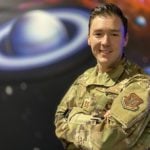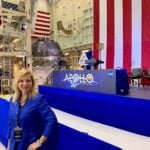Spotlight
Space Foundation Participates in IAC, SGC
Written by: Space Foundation Editorial Team
Two Space Foundation representatives, Director - Space Awareness Kevin Cook and Director - Research & Analysis Micah Walter-Range were on the agenda at the 62nd International Astronautical Congress (IAC) in Cape Town, South Africa, last month. In addition, Walter-Range participated in the Space Generation Congress (SGC), a three-day pre-conference event geared toward young space professionals and students.
Organized by the International Astronautical Federation (IAF) together with the International Academy of Astronautics (IAA), the annual IAC event includes plenary sessions, lectures, meetings and a large exhibition. It is attended by members of the world's space agencies along with academics, researchers, industry and commerce executives, students and young professionals. SGC is organized by the Space Generation Advisory Council (SGAC), a global non-governmental organization that represents university students and young space professionals to the United Nations, space agencies, industry, and academia.
Cook Promotes Space Awareness
Cook's involvement in IAC stemmed from his Space Foundation role of educating the general public about the extraordinary benefits space development provide for those of us on Earth. He co-chaired the 22nd Symposium on Space Activity and Society and delivered the keynote paper for the session on Verifying and Validating the Impact of Technology Transferred from Space. Cook's paper, entitled Improved Public Awareness - Scholarly and Commercial Recognition of Space Products and Services, focused on how the Space Foundation Space Certification and Space Technology Hall of Fame® programs he manages increase public awareness of the practical benefits of space transfer technology. These programs provide special recognition to the organizations and individuals that successfully apply space technology to improve the quality of life on Earth and encourage further innovation.
Walter-Range Talks About Emerging Space Nations, Workforce
In addition to participating in SGC, Walter-Range presented two papers at IAC: Growth in the Global Space Economy and Its Impact on Emerging Space Countries and Analysis of Global Space Workforce and Education. Key points in Walter-Range's papers include:
Global Space Economy
- The steadily increasing size of the space economy provides an economic incentive for emerging countries to participate in space activities
- The growing number of nations engaged in space means that new entrants have a wide range of partners from which to choose
- Fields that have direct applications that benefit emerging countries remain popular choices for the early phases of a nation's space program; analysts expect approximately one third of Earth observation satellites launched between 2009 and 2018 to belong to emerging space countries
Workforce and Education
- High-paying jobs in the space industry require a skilled workforce; at NASA, 99 percent of science and engineering employees hold at least a bachelor's degree and 52 percent hold an advanced degree (master's or higher)
- The number of aerospace engineering bachelor's degrees awarded in the U.S. is returning to the levels seen in the early 1990s after a steep decline in the post-Cold War era
- Science and engineering degrees in most of the developed world remained relatively steady over the past several years, but China more than doubled both the number of bachelor's degrees and doctorates being earned in those fields
Representatives Report on Desire for Collaboration, Expansion
According to Walter-Range, his paper on emerging space nations fit well with the tone of the meeting. "This was the first time in its 62 year history that IAC had been held in Africa, and the African pride was evident throughout the conference," he said. "Not surprisingly, many of the technical sessions were geared toward topics such as the use of space systems by developing countries and the plans of emerging spacefaring nations."
Both Cook and Walter-Range reported that they encountered a recurring theme from the emerging space countries - most of which were African - that collaboration is needed in the short term, but that they expect to develop their own capabilities in the long term. "Representatives from Nigeria and South Africa spoke about developing orbital launch capabilities. Nigeria has a 25 year roadmap for this and South Africa has some basic facilities dating back to the 1980s," said Walter-Range. "In the shorter term, countries such as Nigeria say they plan to reduce their dependence on commercial providers to the extent they can. Nigeria spends $450 million each year to purchase telecom services, so one of the reasons for developing indigenous capacity is to keep the money inside the country in the future."
According to the Space Foundation attendees, other recurring themes that arose during IAC:
- Space activity as a means of spurring science and technology development in broader terms
- Major uncertainty over exploration, partially due to budgets and policy
- Need for international cooperation in an era of fiscal constraints
- Difficulty in recruiting, training and maintaining a skilled workforce
- Huge demand for educational resources in emerging countries
SGC Makes Recommendations
SGC attendees spent about two thirds of their time in five different working sessions, addressing issues that face the space community and forming recommendations. The recommendations were presented to agency leaders at the end of the conference and later passed along to the United Nations Committee on the Peaceful Uses of Outer Space (COPUOS). They focused on:
- Space debris: space situational awareness, better and internationally adopted debris mitigation guidelines and active debris removal
- Radio frequency spectra and satellites: emerging capabilities assesement based on experience, emergency services standardization, safety of life applications and methods to decrease unintentional upward radiation
- Integrating space technology into society: research and development investment, international coordination, communication and outreach, best practices and technology development
- Robotic exploration: robotic and human exploration, international collaboration, risk mitigation, and outreach initiatives
- Space for developing regions: space technology investment vs. spending on terrestrial applications
This article is part of Space Watch: November 2011 (Volume: 10, Issue: 11).


